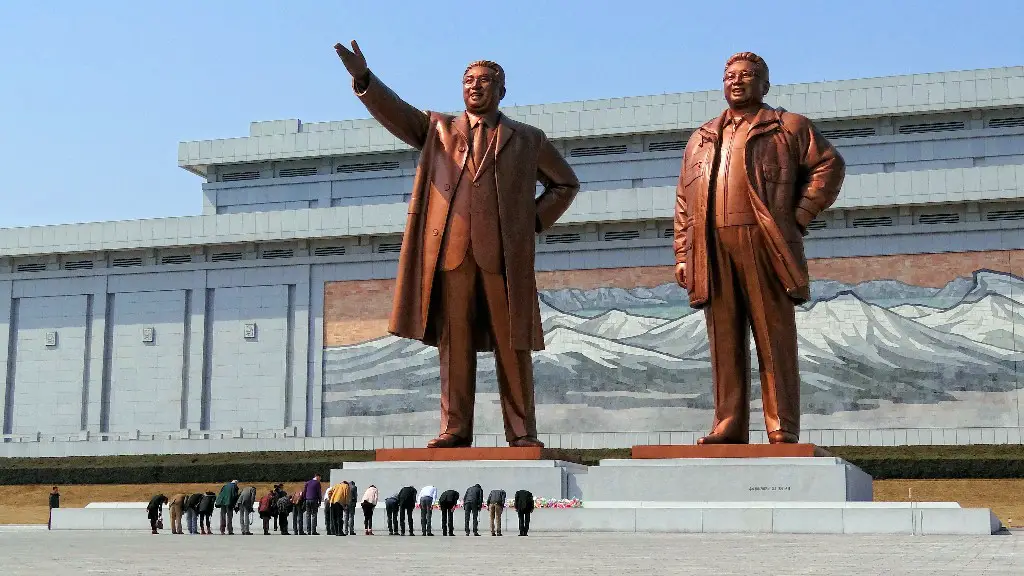North and South Korea have been at odds since the Korean War in 1951. Their relations have been strained and tensions have lingered between the two countries ever since. North Korea is one of the most isolated and secretive countries in the world, cut off from most of the world’s economic and political systems. This has caused a great deal of concern for South Korea, who are directly impacted by any political or military moves made by North Korea. The question, then, is could North Korea actually attack South Korea in a military confrontation, and if so, what would be the potential outcomes?
To understand the potential of a North Korea attack on South Korea, we must first consider the capabilities and strengths of North Korea’s military. According to the 2017 Global Firepower report, North Korea has the fourth largest standing military in the world, with over 1.2 million active military personnel. The country is also one of only nine countries in the world to possess nuclear weapons. In addition, North Korea has an extensive arsenal of conventional weapons, including tanks, artillery, and long-range missiles. These weapons give North Korea the capability to launch a significant attack on South Korea, if desired.
However, North Korea is unlikely to launch a full-scale attack on South Korea. The primary economic arena for North Korea is its export of goods, rather than military actions. Hence, an attack on South Korea would damage North Korea’s ability to export goods and thereby reduce their ability to earn money. Furthermore, North Korea’s strategic interests would also be damaged by attacking South Korea as they would break their own non-aggression pact and incur reactions from the international community.
At the same time, it would be foolish to completely rule out the possibility of a North Korea attack on South Korea. North Korea is notorious for its secretive military operations and has been known to launch surprise attacks on its opponents. South Korea is also geographically close to North Korea and therefore would be a more accessible target than other potential enemies. In addition, the two countries have a history of longstanding tensions, particularly in regard to their differing political systems.
Given the current state of tensions between North Korea and South Korea, experts agree that a North Korea attack on South Korea is unlikely. However, it is also important to remember that North Korea is a difficult country to predict and that anything could happen. It is therefore important for South Korea to remain vigilant and prepared for any potential attack, even if it might be unlikely.
Relations between South and North Korea since War
Since the Korean War in 1951, relations between South and North Korea have remained greatly strained. Despite a few attempts at reconciliation, the two countries have not been able to come to terms on a number of issues, including the reunification of Korea, the use of nuclear weapons, and the human rights situation in North Korea. As a result, North and South Korea have been engaged in a tense stand-off for the past several decades.
The greatest source of tension between the two countries lies in their vastly different political systems. South Korea is a democratic nation that values human rights, while North Korea remains an isolated autocracy. This political divide has caused a great deal of mistrust and suspicion between the two nations, making any sort of negotiation or peace agreement virtually impossible.
The other major source of tension between the two countries is the threat of a North Korea attack on South Korea. North Korea is well known for its extensive arsenal of both conventional and nuclear weapons, and there is always a risk of a military confrontation between the two countries. South Korea, meanwhile, is acutely aware of this threat and has invested heavily in its own military capabilities to protect itself from any possible attack.
All in all, the conflict between North and South Korea is rooted in a long history of distrust and ideological differences, and it shows no signs of abating any time soon. For the time being, both countries must remain on alert and prepared, as the threat of a North Korea attack on South Korea remains a very real possibility.
Economic Impact of North Korea Invading South Korea
The economic consequences of a North Korea attack on South Korea would be extreme. South Korea’s economy has already taken a significant hit due to the COVID-19 pandemic, and an invasion by North Korea would only further cripple its economy. The first and most immediate economic impact of a North Korea attack on South Korea would be the cost of rebuilding. According to a 2017 report by the Congressional Research Service, the cost of rebuilding South Korea after its destruction by a North Korean invasion would be estimated in the hundreds of billions of dollars.
In addition, a North Korea attack on South Korea would cause further economic disruption at the global level. South Korea is one of the world’s leading exporters of goods and services, and the disruption of its economy would create ripples felt around the world. Furthermore, the fear of instability in East Asia could lead to a decrease in global investments and an increase in geopolitical tensions.
Finally, a North Korea attack on South Korea would strain South Korea’s resources and compromise its ability to respond to other challenges. South Korea already has one of the most powerful militaries in the world, and the costs of defending itself against a North Korean attack would be enormous. Furthermore, any resources spent on defense would be resources that could not be used for economic development and other important national initiatives.
Overall, the economic consequences of a North Korea attack on South Korea would be dire and far-reaching, and should serve as a warning to all parties involved. No country should ever have to bear the burden of an invasion, and the potential economic fallout should be weighed heavily before any such decision is made.
Impact of North Korea Attacking South Korea on the World
A North Korea attack on South Korea would have far-reaching implications for the world. In the event of a military confrontation, the consequences could include an increase in global tensions, a decrease in global investments, and an escalation of the arms race. In addition, the conflict could spark other regional conflicts, further destabilizing East Asia and beyond.
The most salient consequence of a North Korea attack on South Korea would be an increase in global tensions. A military conflict between the two countries would likely be viewed as an affront to international law, and it could reverberate beyond the conflict itself. This could spark a series of regional conflicts, as other countries take sides and take action against one another in a bid for power and influence.
Furthermore, the economic repercussions of a North Korea attack on South Korea would be severe. South Korea’s economy is already in a weakened state due to the ongoing COVID-19 pandemic, and an invasion by North Korea would only further weaken its economy. In addition, a decrease in global investments could lead to a global economic downturn and could have a lasting impact on the world’s financial markets.
Finally, a North Korea attack on South Korea could lead to an escalation of the global arms race. Both North and South Korea have extensive arsenals of conventional and nuclear weapons, and neither side is likely to back down in the event of a conflict. This could lead to an increase in arms sales and an escalation of the nuclear arms race between the two countries.
Overall, the implications of a North Korea attack on South Korea would be extensive, and the international community should take all steps necessary to prevent such an event from coming to pass.
Comparing North and South Korean Military Capabilities
Any discussion of a North Korea attack on South Korea must take into account each country’s military capabilities. North Korea has the fourth largest standing military in the world, with over 1.2 million active military personnel and an extensive arsenal of conventional and nuclear weapons. South Korea, meanwhile, has a much smaller military force but is backed by the United States and the larger international community.
A comparison between the two countries’ military capabilities reveals some important differences. North Korea has a larger standing military force, but its conventional weapons are largely outdated. In addition, North Korea’s investment in nuclear weapons is substantial, though they have yet to develop an intercontinental ballistic missile capable of striking the United States.
South Korea’s military, on the other hand, is vastly superior. The country has the latest in military technology, including the most advanced air defense systems and the most sophisticated ballistic missiles. In addition, South Korea is backed by the United States and its allies, making it a formidable force and a difficult target for any potential aggressor.
Overall, a comparison of North and South Korean military capabilities reveals that a North Korea attack on South Korea would be no easy task. The South Korean military is well-equipped and well-supported, and any aggression from North Korea would almost certainly be met with a swift and forceful response.
Future Prospects of North and South Korean Relations
What hope is there for the future of North and South Korean relations? Despite decades of tension, the two countries have taken small steps towards reconciliation in the past few years. For example, North and South Korea agreed to re-open military communication lines in 2018, and in 2019, they held their first summit in over a decade. These efforts have been welcomed by the international community, though may are keen to see further progress before considering the conflict truly resolved.
Despite the optimism surrounding recent diplomatic rapprochement between North and South Korea, there is still a great deal of mistrust between the two countries. North Korea’s human rights record and willingness to threaten South Korea with military action has created an atmosphere of distrust, making it difficult for the two sides to truly come to terms. Furthermore, the two countries’ differing ideologies make the prospect of a unified Korea seem unlikely in the near future.
At the same time, it is important to note that North and South Korea have made significant strides towards reconciliation in the past few years. While tensions between the two countries remain high, the fact that they are even engaging in dialogue is a positive sign. Furthermore, the possibility of a North Korea attack on South Korea appears to be increasingly distant, and the two countries seem to be moving towards a more peaceful future.
Ultimately, the future of North and South Korea is uncertain, but there is a glimmer of hope for greater reconciliation. As long as both sides remain committed to open dialogue and are willing to work towards a unified Korea, there is a chance for the two countries to eventually bridge their differences and build a better future for both nations.





